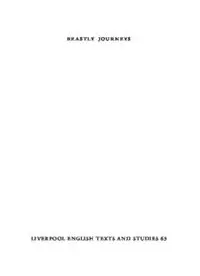
Beastly Journeys: Travel and Transformation at the fin de siècle PDF
Preview Beastly Journeys: Travel and Transformation at the fin de siècle
be astly jour neys LIVER POOL ENGLISH TEXTS AND STUDIES 63 BEASTLY JOURNEYS Travel and Transformation at the fn de siècle TIM YOUNGS LIVERPOOL UNIVERSITY PRESS First published 2013 by Liverpool University Press 4 Cambridge Street Liverpool L69 7ZU Copyright © 2013 Tim Youngs Te right of Tim Youngs to be identifed as the author of this book has been asserted by him in accordance with the Copyright, Designs and Patents Act 1988. All rights reserved. No part of this book may be reproduced, stored in a retrieval system, or transmitted, in any form or by any means, electronic, mechanical, photocopying, recording, or otherwise, without the prior written permission of the publisher. British Library Cataloguing-in-Publication data A British Library CIP record is available ISBN 978-1-84631-958-7 cased Typeset by XL Publishing Services Printed and bound by CPI Group (UK) Ltd, Croydon CR0 4YY For John and Pauline Lucas Contents Acknowledgements ix Introduction: Te Unchaining of the Beast 1 1 City Creatures 39 2 Te Bat and the Beetle 74 3 Morlocks, Martians, and Beast-People 107 4 ‘Beast and man so mixty’: Te Fairy Tales of George MacDonald 140 5 Oscar Wilde: ‘an unclean beast’ 165 Conclusion 197 Bibliography 21 Index 20 vii Acknowledgements Tis book has had a long gestation. Early stages of it were supported through research leave funded by the Arts and Humanities Research Board and through my own university department’s sabbatical programme. I am grateful to both bodies. Te following people have also helped through, variously, their provision of ideas, information, encour- agement, and the hosting of lectures, seminars, and conferences at which early drafts of some material were tried out: Chris Barker, Dinah Birch, Joseph Bristow, Antoinette Burton, Viv Chadder, Stephen Donovan, Justin D. Edwards, R. J. (Dick) Ellis, Charles Forsdick, Shirley Foster, Christopher Gair, Indira Ghose, Mike Green, Lynne Hapgood, Tracey Hill, Peter Hulme, Philip Leonard, John Lucas, Roger Luckhurst, Gesa Mackenthun, Richard Pearson, Lyssa Randolph, Ray Russell, Wim Tigges, Richard White, Martin Willis, and David Woods. My thanks go also to the inter-library loans team at Nottingham Trent University. I am especially grateful to Anthony Cond for encouraging submission of the book to Liverpool University Press and for his patience and good humour in seeing it through to publication. Any weaknesses, oddities, and errors are my own. Portions of Chapter One and Chapter Tree have their origins in three earlier essays, whose ideas they develop: ‘Stevenson’s Monkey-Business: Te Strange Case of Dr. Jekyll and Mr. Hyde’, in Peter Liebregts and Wim Tigges, eds, Beauty and the Beast: Christina Rossetti, Walter Pater, R. L. Stevenson and their Contemporaries (Amsterdam: Rodopi, 1996), pp.157–170; ‘Wells’s Fifth Dimension: Te Time Machine at the Fin de Siècle’, in Tracey Hill and Alan Marshall, eds, Decadence and Danger: Writing, History and the Fin de Siècle (Bath: Sulis Press, 1997), pp.64–74; and ‘Te Plasticity of Living Forms: Beasts and Narrative in Te Octopus and Te Island of Doctor Moreau’, Symbiosis: A Journal of Anglo-American Literary Relations 1, 1 (April 1997), 86–103. I am grateful to Rodopi, Tracey Hill, and Christopher Gair respectively for allowing me to draw ix x be astly jour neys on this nascent material. For permission to quote from H. G. Wells’s works I am grateful to A. P. Watt. As ever, the greater and lasting acknowledgement is to Gurminder and Natty for being who they are.
